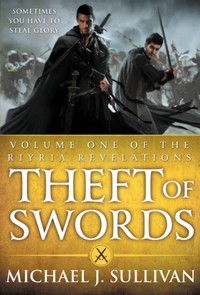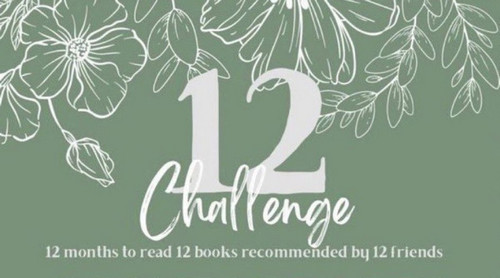 Theft of Swords
Theft of Swords
DETAILS: Series: The Riyria Revelations, Volume 1 Publisher: Orbit Publication Date: November 23, 2011 Format: Paperback Length: 649 pg. Read Date: November 10-16, 2022

First Things First
Back in Down the TBR Hole (18 of 24+) (January 2021), I removed a form of this book from my “Want-To-Read” list, despite everyone I’d ever talked to about Sullivan being a fan. In response, Bookstooge did offer a pretty convincing counter-argument, “BECAUSE I SAID SO!!!!” I should have listened. Sorry, Bookstooge! Thankfully, Micah recommended this for the 12 Books Challenge, so my compounded errors (not reading it as soon as I put it on my “Want-To-Read” shelf, removing it from my list, and then ignoring that Bookstooge) were corrected.
It’s pretty obvious already, but let me officially spoil the conclusion of this post: I heartily encourage picking up this book.
What’s Theft of Swords About?
The Riyria are thieves—so proficient, so renowned that they might not actually exist. They may be the Fantasy World equivalent of Urban Legends. Except they really do exist—they are Hadrian Blackwater a mercenary fighter who’s about as skilled a swordsman as you’re going to find, and Royce Meborn, a thief who’s probably better at that than Hadrian is with a sword. Together they can steal just about anything. Hadrian has a strong impulse to do the heroic action, he wants to help. Royce is a misanthrope who is only interested in helping himself and a few friends and acquaintances. Except when he’s not.
This book is about two jobs they should not have taken but do. And then all the things they have to do after taking those jobs. At the core, each job is about stealing a sword. That’s pretty much where the similarities end.
The first has them hired to steal a sword from the King’s castle (it doesn’t belong to any member of the royal family, but someone who is visiting there). This job lands them in prison, in the middle of an investigation into the murder of a royal, in an effort to save two other royals, and freeing another prisoner or two.
The second involves them helping a damsel in distress and her family—and it’s Royce’s call to take this job for far less than it’s going to cost them to carry it out. That job lands them in the battle to save a small village, in the middle of a conspiracy to wrest power from the rightful possessor, and in danger of being eaten by a magical lizard.
What will see them through is a very strange assortment of allies and each other. And a whole lot of luck—much of which they have to manufacture or steal from themselves. In the end, it will put the pair on a path that may lead to changes in the broken empire they live in—very unbeknownst to them (or they’d probably run screaming in the other direction).
The Dialogue
As a genre, Fantasy isn’t well-known for having snappy and witty dialogue. Of course, there are exceptions—and I can point to a number of them on my own shelves, you don’t need to point out all the ways I’m wrong. But come on, let’s be real here—from Tolkein on, it’s rare that you read dialogue that really grabs you outside of a line or two. It’s what the characters are and do that attracts you, it’s the stories, it’s the settings, etc.
Put the Riyria Revelations down as one of those exceptions. I was pretty sure of this on page three, and the 646 following pages didn’t change my mind. It’s strongest between Royce and Hadrian—they’re the veterans who’ve seen enough that they can have a wry detachment from danger and drama to joke their way through it. But there’s plenty to get a kick out of in the conversation of others.
The narrative voice that shows us what the characters are thinking and not saying is good, possibly better.
The Politics
In addition to your nobles of various ranks and importance of land-holdings vying for prominence against each other, there are three political movements running around this world—I’m not going to describe them much because I’m afraid I’m going to miss a nuance or two and give a skewed description given my space constraints. I’m not accustomed to seeing something like this in Fantasy—seeing two competing political philosophies/contingents within one Empire/Kingdom, sure—but the way it’s set up here (and we really have only scratched the surface up to this point) seems pretty novel.
On top of that, there are some ecclesiastical machinations and divided camps within the same religion (or one religion with two divergent streams…I’m not one hundred percent sure the fairest way to describe this)—a mix of conviction and connivance for political power. There are a lot of earnest believers within the clergy, some that may believe, but are more convinced they’re right when it comes to affairs of this world, and some that are really good at using the belief of others to get their way.
Adding the ecclesiastical politics into the mix with the wholly secular stuff? Sullivan’s really given us a treat here. In this particular book, it’s largely (but not wholly) a backdrop to the main action—but I doubt it’s going to stay that way for long.
Then there are the relations between races like Dwarves and Elves marked by prejudice and distrust all around. I can’t wait to see how some of this plays out.
The Wizard
There’s a Gandalf/Allanon/Bayaz-ish wizard in the middle of all of this. I really want to like him, and think I do. I really want to distrust him deeply. And I definitely do.
Is he Gandalf or is he Saruman? I’m not sure. He may be a little of both. He may be neither. Don’t know. Don’t care (at least for now). He’s a fantastic character to watch at work.
In retrospect, I guess that makes him more like Bayaz than the rest of the names I’ve tossed around. But Bayaz might be more trustworthy.
So, what did I think about Theft of Swords?
I’ve enjoyed being exposed to works I probably/definitely wouldn’t have gotten around to because of this challenge. Personally, Micah‘s recommendation has solidified a lesson I will definitely learn from. He’s now recommended the DI Eva Harris series, the DC Smith/Kings Lake Investigation series, and this one. I need to start following his recommendations blindly.
Okay, that personal note out of the way, let’s focus on the book—by mid-way through the opening scene, I was hooked—and had basically signed up for the trilogy. While not really being the same kind of scene, it evoked the same kind of feel as the opening of “Our Mrs. Reynolds” (the “if your hand touches metal, I swear, by my pretty floral bonnet, I will end you.” scene). That feeling continued to grow through the first book. I don’t think it deepened in the second book, but it didn’t falter.
I’ve already invoked Firefly, and this hit the pleasure center in the brain as that show did—also Kings of the Wyld and The Lies of Locke Lamora. I think the storytelling of this is more straightforward than Lynch’s, but there’s a similar vibe. The relationship between Royce and Hadrian is as tight as you’re going to find in the aforementioned works—they might as well be brothers (they’re closer than, say, the twins Caramon and Rastlin Majere). But they’re quick to add others as friends and allies—or even to their “family” group. Remarkably, this also extends to those they’d planned on killing at the first opportunity. This gives the whole book this warm glow of camaraderie that just augments the likability of all the characters—and the novel as a whole. I fully expect this to continue throughout the series.
The action is great, I loved the sword fights, in particular. We get character deaths that might as well be punches to the gut (when you don’t want to cheer them). The imagination showed in the magic system, the magical creatures, and the politics—between races, within the remnants of the human empire, and the ecclesiastical politics—are really well conceived and effectively portrayed. On that last point, I really want to stress how nicely (not perfectly, but good enough) Sullivan catches us up on hundreds of years of history and backstory without making the infodumps painful and/or dull. These villains are truly foul, and yes, it’s typically pretty clear who’s a White Hat and who’s a Black Hat from the initial meeting—but Sullivan also gives us some characters that could easily go either way before this series ends—possibly bouncing back and forth, too. I relish a good combination like that.
In a very real sense, there’s almost nothing that someone who’s read/watched a handful of fantasy series hasn’t been exposed to before. It’s the way that Sullivan has assembled these tried and true elements that is going to make you happy—that and the characters. Not just Hadrian and Royce, but especially Hadrian and Royce. Their banter alone would be enough to sign me up for two more books.
I think I’m in danger of just finding new ways to say that I really dug this work without adding anything worth reading, so I’m going to cut myself off. If you haven’t read this yet, and you enjoy a good fantasy adventure—this is me adding my voice to your friends who have probably already told you to read this. If you don’t have any friends who’ve given you that advice already, I’ll loan you a couple of mine.


This post contains an affiliate link. If you purchase from it, I will get a small commission at no additional cost to you. As always, the opinions expressed are my own.
![]()



Bookstooge
Glad to hear you finally got around to reading this.
HCNewton
So am I, so am I. And I’ve got the next two scheduled for early ’23.
Better late than never.